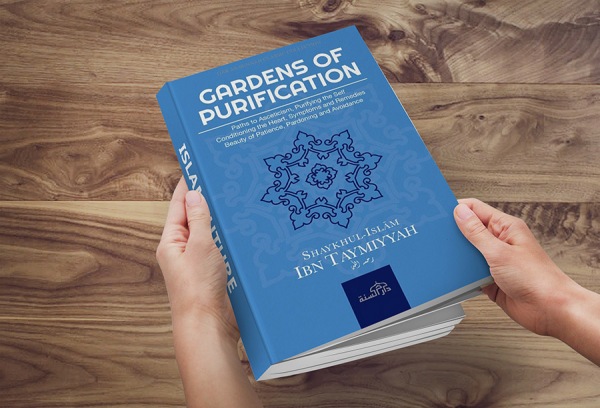
SHAYKHUL-ISLĀM IBN TAYMIYYAH (D. 728H)
Language: English | Format: PDF | Pages: 339 | Size: 24 MB
Gardens of Purification by Shaykhul-Islām Ibn Taymiyyah (d. 728H)
Paths to Asceticism, Purifying the Self, Conditioning the Heart, Symptoms and Remedies Beauty of Patience, Pardoning and Avoidance
Allāh the Most High Said: “And hasten to the forgiveness of your Lord and a Paradise as wide as the Heavens and the Earth prepared for those who fear Allāh” [Aali ‘Imrān: 133] Citing his teacher Shaykh al-Islām Ibn Taymiyyah, Ibn Al-Qayyim said that, ‘zuhd is to leave something that has no benefit for one’s Hereafter. And wara’ is to leave something for fear of harming one’s Hereafter.”
Zuhd reflects a lack of want and desire for something, and wara’ is to abstain from something and guard against potential hazards. Yet both these qualities are nuanced and the correct course to take in assuming asceticism and piety is to abstain from unlawful acts and desires, while being moderate in all forms of worship. It is primarily knowing that adherence to the Sunnah preserves its followers from the blameworthy desirous self and the evil it harvests.
Indeed those who follow paths of religious innovation cannot escape falling into the traps of sins and being shackled by its chains because it is a consequence of following desires. It is for this reason, innovators are called people of desires; and while the path of the Sunnah is paved with knowledge, justice and guidance – the path of innovation is paved with ignorance, oppression, and pursuit of speculation and whatever the desirous self is apt to want.
This English translation of ‘Al-Zuhd wal Wara’ wal Ibādah’ is from the shorter works penned by Shaykh al-Islām Ibn Taymiyyah. Within it, he signposts profound points on self-purification in thorough detail, presenting a refreshing outline the reader can easily appreciate and administer in his his/her daily life.
The author, Taqī Al-Dīn Abū’l-`Abbās Aḥmad ibn `Abdu’l-Salām ibn Taymiyyah al-Ḥarrānī (d. 728h) was a leading Ḥanbali scholar and a Mujtahid in his own right. His breadth of learning and depth of understanding was accepted by all of his peers and many of his biographers stated that he clearly surpassed the vast majority, if not all of the scholars of his time. He was a prolific writer and skilled orator. He was deeply religious and unwavering in his adherence to Islām and the Sunnah and repudiating all that opposed it. Continue reading
